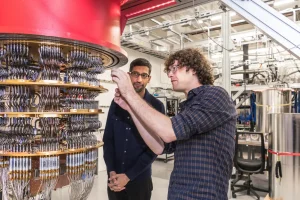Microsoft’s Azure Quantum team, using AI and supercomputing, identified 540,000 stable battery material candidates in under a week—a task that would take decades via traditional methods.
Technical Insight:
- A generative AI model trained on the Materials Project database predicted novel lithium-ion alternatives.
- Candidates were validated via quantum mechanical simulations on supercomputers, narrowing the list to 18 promising materials now in lab testing.
Applications:
- EVs: Safer, faster-charging batteries with 2x energy density.
- Grid Storage: Low-cost materials for renewable energy storage.
Impact: Could reduce global reliance on rare minerals like cobalt, 70% of which is mined in conflict-prone regions.
Criticism: Environmental costs of scaling production for new materials remain unstudied.
